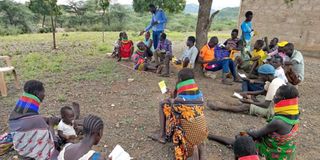Peace and resilience project a game changer for border communities

Women at Urum village, Turkana county being trained on entrepreneurship skills on September 10, 2022. Peacebuilding initiatives are critical in Turkana because of its strategic location bordering Uganda, South Sudan and Ethiopia.
Border pastoral communities in Kenya, Uganda and Ethiopia are vulnerable to cross-border conflicts and drought and are embracing the peace and resilience project aimed at enhancing economic development and cross-border peace building engagements.
The communities a.Border pastoral communities in Kenya, Uganda and Ethiopia are embracing a peace and resilience project aimed at enhancing economic development and cross-border peace building engagements.
The communities are vulnerable to cross-border conflicts and drought.
German funded
The Strengthening the Resilience of the Livelihoods of Agro-Pastoralists in Eastern Africa (SRAPLEA) programme, rolled out by Welthungerhilfe (WHH) with funding from the German federal ministry for economic cooperation and development, also seeks to cement peaceful coexistence.
Ms Adipo Lochuro is among 6,600 families targeted as direct beneficiaries and more than 80,000 that will benefit indirectly in Loima and Turkana West sub-counties. He has already felt the positive impact of the project after she was trained on entrepreneurship skills in the pilot stage.
"For three months, I learnt about entrepreneurship, hygiene, literacy and numeracy skills and benefited from business starter kits,” Ms Lochuru said.
“My kit that comprised 13 rolls of beads, a 50kg bag of tobacco and the 20-litre jerricans of petrol enabled me to open a manyatta shop."

Ms Adipo Lochuro, a beneficiary of the Strengthening the Resilience of the Livelihoods of Agro-Pastoralists in Eastern Africa (SRAPLEA) programme at Urum village in Loima Sub County displaying jerricans of petrol for her business on September 10, 2022.
Barter trade
She sold her items through barter trade with other members of the community who had no cash but had a lot of goats that would either be wiped out during drought or stolen in attacks.
She recalled that an exchange of a goat with two rolls of beads and half a kilo of tobacco – with the local market price of half a kilo of tobacco at Sh120 and one roll of bread at Sh70 – motivated her.
She sold the goat for Sh4,000 on market day in Kakuma, earning her a decent profit that she used to buy other commodities, like much needed veterinary drugs.
In her Urum village, locals are yet to embrace livestock trade and that is why barter trade is still the most desired method of trading.
Coaching
Through continuous coaching and learning sessions, Ms Lochuru enrolled in a Village Savings and Loans Association (VSLA) of 160 women, who have also been benefiting from micro grants to boost their businesses.
Equity Bank, where she opened a savings account, also identified her as one of their agents to disburse cash to the vulnerable population in her village under the national Hunger Safety Net Programme (HSNP).
"Group members purchase their business stocks from my shop. In my individual capacity, I offer advice to them on how to make their ventures successful," Ms Lochuru said.
The organisation has partnered with a local implementing organisation called Lokado to reach out to more beneficiaries for the next two years.

Turkana Deputy Governor John Erus addressing participants during the launch of Strengthening the Resilience of the Livelihoods of Agro-Pastoralists in Eastern Africa (SRAPLEA) forum in Lodwar on September 10, 2022.
Second phase
Deputy Governor John Erus, who on Saturday launched the second phase of the project, lauded partners in the initiative, stating that its objectives align with the new county administration’s development agenda.
“I have noted that one of the targeted results for the SRAPLEA project is cross-border and inter-conflict management. This fits into another priority in our agenda for Turkana on peacebuilding and conflict resolution," Dr Erus said.
He noted that peacebuilding initiatives were critical in Turkana because of its strategic location bordering Uganda, South Sudan and Ethiopia.
"Together with relevant development partners, we will collaborate in strengthening cross-border community dialogues, institute early warning mechanisms for conflict prevention and commit to support reformed warriors,” he said.
Strengthen partnership
He promised partners that the administration will strengthen strategic partnerships as the county government embarks on delivering its mandate to Turkana residents.
The county, he said, will review partnership programmes to ensure targeted impacts are achieved and residents benefit from donor-funded projects.
Dr Erus reiterated that investment in cross-border social infrastructure will contribute to peaceful coexistence, calling for more investment in markets to boost trade and water projects for pastoralists.
He said the county will support mass vaccination and treatment, capacity development of community disease reporters and community health volunteers, and livestock traders to grow commercial pastoralism.
George William Wopuwa, the Moroto, Uganda, resident district commissioner, promised that the Ugandan administration will partner with Kenyan stakeholders on cross-border peace programmes.
Mr Wopuwa was confident these collaborations will succeed, saying he had witnessed how passionate the new Turkana County administration was at past consultative meetings in Lodwar in Kenya and Abim and Moroto in Uganda.





